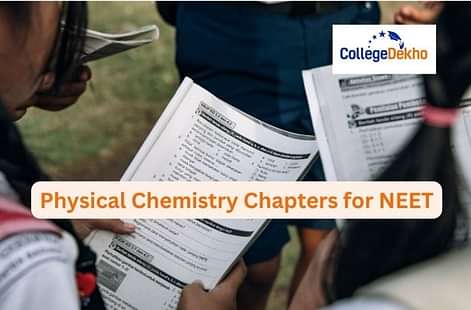- Changes in NEET 2025 Physical Chemistry Syllabus
- Physical Chemistry Chapters for NEET: Unit-wise Topics
- NEET 2025 Physical Chemistry Chapters Weightage
- Class 12 Physical Chemistry Chapter-Wise Weightage
- NEET 2025 Physical Chemistry Important Topics From Class 12
- NEET 2025 Physical Chemistry Recommended Books
- Removed Physical Chemistry Chapters from NEET Syllabus 2025
- Physical Chemistry Chapters for NEET: Class-wise Weightage
- Physical Chemistry for NEET - Chapter-wise Weightage
- Physical Chemistry Chapters in NEET - Difficulty Level
- NEET 2025 Physical Chemistry Chapters Marking Scheme
- How to Prepare NEET 2025 Physical Chemistry Chapters?
- Faqs

NEET 2025 Physical Chemistry Chapters comprise the important topics to be covered in the upcoming NEET 2025 exam. The NEET 2025 Physical Chemistry Chapters include the topics with most weightage in the NEET 2025 Chemistry Syllabus , from Classes 11th and 12th combined. To offer an example, some of the important topics included in the NEET 2025 Physical Chemistry Chapters are Atomic Structure, Chemical Bonding and Molecular Structure, Chemical Thermodynamics, Solutions, Equilibrium, etc. Moreover, by referring to the NEET 2025 Physical Chemistry Chapters, students will be able to understand the marking scheme in the upcoming NEET Exam. The NEET Chemistry syllabus is divided into Physical Chemistry, Organic Chemistry, and Inorganic Chemistry sections.
The NTA will conduct the NEET 2025 Exam on May 4, 2025, in offline mode, in a single shift. Therefore, students gearing up for the upcoming entrance exam must refer to the NEET 2025 Physical Chemistry Chapters to secure a good score in the NEET UG 2025 Exam. The NTA has revised the NEET 2025 Chemistry Syllabus by removing and adding topics to the NEET 2025 Physical Chemistry Chapters. To construct the best preparation strategy for NEET Chemistry section, referring to NEET 2025 Physical Chemistry Chapters along with NCERT textbooks, sample papers and previous years’ question papers is the way to go. To know more about the NEET 2025 Physical Chemistry Chapters in detail, such as the units, important topics, revised syllabus, how to prepare, etc., refer to the following article provided below.
Changes in NEET 2025 Physical Chemistry Syllabus
As per the official NEET 2025 Syllabus PDF, there are no significant changes to the NEET 2025 Physical Chemistry syllabus as compared to the previous year. The core focus of the NEET 2025 Physical Chemistry Chapters remains unchanged and on topics such as thermodynamics, chemical kinetics, equilibrium, and solutions, with an emphasis on understanding the physical principles behind chemical reactions and states of matter, and solving numerical problems based on these concepts. Moreover, some minor advanced topics and detailed derivations have been removed from the NEET 2025 Physical Chemistry Chapters this year to help the students prepare effectively. Apart from this, there are no major changes or modifications to the NEET 2025 Physical Chemistry Chapters.
Physical Chemistry Chapters for NEET: Unit-wise Topics
The Physical Chemistry Chapters for NEET 2025 covers eight units. Below is the detailed syllabus for this section.
Unit I
The Unit 1 of the NEET Physical Chemistry Syllabus comprises all the important details about Some Basic Concepts of Chemistry. Some of the important topics in this chapter include Matter and its Nature, Dalton's Atomic Theory, Laws of Chemical Combination, Atomic and Molecular Masses, Mole Concept, Molar Mass, etc.Some Basic Concepts of Chemistry | ||
|---|---|---|
Matter and its Nature | Dalton's Atomic Theory: Concept of Atom, Molecule, Element, and Compound | Laws of Chemical Combination |
Atomic and Molecular Masses | Mole Concept | Molar Mass |
Percentage Composition | Empirical and Molecular Formulae: Chemical Equations and Stoichiometry | -- |
Unit II
The Unit 2 of the NEET Physical Chemistry Syllabus comprises all the important details about Atomic Structure. Some of the important topics in this chapter include Spectrum of the Hydrogen Atom, Dual Nature of Matter, Elementary Ideas of Quantum Mechanics, De Broglie's Relationship, Quantum Mechanics, etc.Atomic Structure | ||
|---|---|---|
Nature of Electromagnetic Radiation, Photoelectric Effect | Spectrum of the Hydrogen Atom | Bohr Model of a Hydrogen Atom - its Postulates, Derivation of the Relations for the Energy of the Electron and Radii of the Different Orbits |
Limitations of Bohr's Model | Dual Nature of Matter | De Broglie's Relationship |
Heisenberg Uncertainty Principle | Elementary Ideas of Quantum Mechanics | Quantum Mechanics |
The Quantum Mechanical Model of the Atom | Concept of Atomic Orbitals as One-electron Wave Functions: Variation of Ψ and Ψ2 with r for 1s and 2s Orbitals | Shapes of s, p, and d - Orbitals |
Electron Spin and Spin Quantum Number | Rules for Filling Electrons in Orbits - Aufbau Principle | Pauli's Exclusion Principle and Hund's Rule |
Electronic Configuration of Elements, and Extra Stability of Half-filled and Filled Orbitals | -- | -- |
Unit III
The Unit 3 of the NEET Physical Chemistry Syllabus comprises all the important details about Chemical Bonding and Molecular Structure. Some of the important topics in this chapter include Ionic Bonding, Covalent Bonding, Molecular Orbital Theory, Elementary Idea of Metallic Bonding, Valence Bond Theory, Hydrogen Bonding and its Applications, etc.Chemical Bonding and Molecular Structure | ||
|---|---|---|
Kossel-Lewis Approach to Chemical Bond Formation | Ionic Bonding | Covalent Bonding |
Quantum Mechanical Approach to Covalent Bonding | Molecular Orbital Theory | Elementary Idea of Metallic Bonding |
Concept of Ionic and Covalent Bonds | Valence Bond Theory | Hydrogen Bonding and its Applications |
Unit IV
The Unit 4 of the NEET Physical Chemistry Syllabus comprises all the important details about Chemical Thermodynamics. Some of the important topics in this chapter include Fundamentals of Thermodynamics, The First Law of Thermodynamics, The Second Law of Thermodynamics, etc.Chemical Thermodynamics | ||
|---|---|---|
Fundamentals of Thermodynamics | The First Law of Thermodynamics | The Second Law of Thermodynamics |
Unit V
The Unit 5 of the NEET Physical Chemistry Syllabus comprises all the important details about Solutions. Some of the important topics in this chapter include Different Methods for Expressing the Concentration of Solution, Vapour Pressure - Composition, The Elevation of Boiling Point and Osmotic Pressure, etc.Solutions | ||
|---|---|---|
Different Methods for Expressing the Concentration of Solution | Percentage (by volume and mass both) | Vapour Pressure of Solutions and Raoult's Law |
Vapour Pressure - Composition | Plots for Ideal and Non-Ideal Solutions | Depression of Freezing Point |
The Elevation of Boiling Point and Osmotic Pressure | Determination of Molecular Mass Using Colligative Properties | Van't Hoff Factor and its Significance. |
Unit VI
The Unit 6 of the NEET Physical Chemistry Syllabus comprises all the important details about Equilibrium. Some of the important topics in this chapter include Common Ion Effect, Hydrolysis of Salts and PH of their Solutions, Ionic Equilibrium: Weak and Strong electrolytes, Ionization of Electrolytes, PH Scale, etc.Equilibrium | ||
|---|---|---|
Meaning of Equilibrium, the Concept of Dynamic Equilibrium | Equilibrium Involving Chemical Processes | Equilibria Involving Physical Processes |
Common Ion Effect | Hydrolysis of Salts and PH of their Solutions | Ionic Equilibrium: Weak and Strong electrolytes |
Ionization of Electrolytes | PH Scale | -- |
Unit VII
The Unit 7 of the NEET Physical Chemistry Syllabus comprises all the important details about Redox Reactions and Electrochemistry. Some of the important topics in this chapter include Electrochemical Cells, Different Types of Electrodes, Electrode Potentials including Standard Electrode Potential, Half-cell and Cell Reactions, EMF of a Galvanic Cell and its Measurement, Relationship between Cell Potential and Gibbs' Energy Change, etc.Redox Reactions and Electrochemistry | ||
|---|---|---|
Electrochemical Cells - Electrolytic and Galvanic Cells | Different Types of Electrodes | Electrode Potentials including Standard Electrode Potential |
Half-cell and Cell Reactions | EMF of a Galvanic Cell and its Measurement | Relationship between Cell Potential and Gibbs' Energy Change |
Electronic concepts of Oxidation-Reduction | Redox Reactions, Oxidation Numbers, Rules for Assigning Oxidation Numbers, Balancing of Redox Reactions | Electrolytic and Metallic Conduction |
Conductance in Electrolytic Solutions | Molar Conductivities and their Variation with Concentration | Kohlrausch's Law and its Applications |
Unit VIII
The Unit 8 of the NEET Physical Chemistry Syllabus comprises all the important details about Chemical Kinetics. Some of the important topics in this chapter include Rate of a Chemical Reaction, Elementary and Complex ReactionsChemical Kinetics | ||
|---|---|---|
Rate of a Chemical Reaction | Elementary and Complex Reactions | Rate Law, Rate Constants and its Units |
Differential and Integral Forms of Zero and First-order Reactions | Effect of Temperature on the Rate of Reactions | Arrhenius Theory |
Activation Energy and its Calculation | Collision Theory of Bimolecular Gaseous Reactions (no derivation) | -- |
Check out the complete NEET Chemistry Syllabus 2025 here! | ||
Also Read:
NEET 2025 Organic Chemistry Chapters
NEET 2025 Physical Chemistry Chapters Weightage
Physical Chemistry is a scoring section in the NEET exam 2025, where many important chapters make contributions with various scores in the whole examination. The weightage for every chapters in NEET Physical Chemistry differs because of the relevance and how often they come in the NEET previous year's question papers. Check out the Class 11 Physical Chemistry Chapter-wise Weightage from the table below:
NEET Physical Chemistry Chapter | Weightage | Average Number of Questions | NEET Topic-wise Weightage |
|---|---|---|---|
Some Basic Concepts of Chemistry | 3-4% | 2-3 questions | Focuses on fundamental concepts like the mole concept, and laws of chemical reactions. |
Structure of Atom | 3-4% | 2-3 questions | The key for understanding atomic models and quantum theory. |
States of Matter | 2-3% | 1-2 questions | Important for understanding gas laws and properties of solids. |
Thermodynamics | 7-8% | 4-5 questions | High weightage, deals with laws of thermodynamics, enthalpy, and entropy. |
Equilibrium | 6-7% | 3-4 questions | Important for understanding chemical equilibrium and Le Chatelier’s principle. |
Redox Reactions | 2-3% | 1-2 questions | Focuses on oxidation-reduction reactions and balancing equations |
Class 12 Physical Chemistry Chapter-Wise Weightage
Check out the Class 12th Physical Chemistry Chapter-wise weightage from the table below:
Chapter | Weightage | Average Number of Questions | NEET Topic-wise Weightage |
|---|---|---|---|
Solid State | 2-3% | 1-2 questions | Deals with the properties and structures of solids, types of solids, and crystallography. |
Solutions | 4-5% | 2-3 questions | Covers properties of solutions, Raoult’s law, and colligative properties. |
Electrochemistry | 6-7% | 3-4 questions | High weightage, focuses on electrochemical cells, the Nernst equation, and electrolysis. |
Chemical Kinetics | 6-7% | 3-4 questions | Important for reaction rates, Arrhenius equation, and activation energy. |
Surface Chemistry | 2-3% | 1-2 questions | Focuses on adsorption, catalysis, colloids, and micelles |
NEET 2025 Physical Chemistry Important Topics From Class 12
The candidates must focus on the important topics from NEET Physical Chemistry subject to score good marks in the exam. Check out the list of important topics from the table below:
NEET Physical Chemistry Chapter | Difficulty Level |
|---|---|
Some Basic Concepts of Chemistry | Moderate |
Structure of Atom | Moderate to High |
States of Matter | Moderate |
Thermodynamics | High |
Equilibrium | High |
Redox Reactions | Moderate |
Solid State | Moderate |
Solutions | Moderate |
Electrochemistry | High |
Chemical Kinetics | High |
Surface Chemistry | Moderate |
NEET 2025 Physical Chemistry Recommended Books
Check out the NEET 2025 Physical Chemistry recommended books from the table below:
NEET Physical Chemistry Books | Author/Publisher |
|---|---|
GRB A Textbook of Physical Chemistry for NEET & All Other Competitive Entrance Examinations (Based on NCERT) | O.P. Tandon & A.S. Singh |
NEET Objective Chemistry Volume 1 | Dr. RK Gupta |
NEET Objective Chemistry Volume 2 | Dr. RK Gupta |
Modern's abc Plus of Chemistry for Class-11 (Part I & II) Dr. S.P. Jauhar (Latest Edition) | Dr. S.P. Jauhar |
Modern's ABC+ Chemistry (Part I & II) for Class 12- by S.P. Jauhar (2024-25 Examination) | Dr. S.P. Jauhar |
Removed Physical Chemistry Chapters from NEET Syllabus 2025
NEET Chapters for Physical Chemistry no longer include the following units or chapters:
Units | Chapters |
|---|---|
Some Basic Concepts of Chemistry | Concept of shells and subshells - Atomic number, isotopes, and isobars - Dual nature of matter and light - General Introduction: Importance and scope of chemistry - Structure of Atom |
Environmental Chemistry | Pollution due to industrial wastes - Greenhouse effect and global warming - Acid rain, ozone, and its reactions - Effects of depletion of ozone layer - Chemical reactions in the atmosphere - Strategy for the control of environmental pollution - Environmental pollution: Air, water, and soil pollution - Smogs and major atmospheric pollutants - Green chemistry as an alternative tool for reducing pollution |
Chemistry in Everyday Life | Chemicals in food: Preservatives, artificial sweetening agents, elementary idea of antioxidants - Cleansing agents: Soaps and detergents, cleansing action - Chemicals in medicines: Analgesics, tranquillizers, antiseptics, disinfectants, antimicrobials, antifertility drugs, antibiotics, antacids, antihistamines |
Surface Chemistry | Tyndall effect, Brownian movement, electrophoresis, coagulation - Adsorption: Physisorption and chemisorption; factors affecting adsorption of gases on solids - Colloidal state: Distinction between true solutions, colloids, and suspensions; lyophilic, lyophobic, multimolecular, and macromolecular colloids; properties of colloids - Emulsions: Types of emulsions - Catalysis: Homogeneous and heterogeneous, activity, and selectivity; enzyme catalysis |
Got questions? Take a look at the FAQs Regarding NEET 2025 Syllabus by NTA
Physical Chemistry Chapters for NEET: Class-wise Weightage
As NEET covers material from both Class 11th and Class 12th, the table below outlines the weightage of NEET Physical Chemistry syllabus from each class and section.
Section | NEET Physical Chemistry Questions from Class 11 | NEET Physical Chemistry Questions from Class 12 |
|---|---|---|
Section A | 5% | 6% |
Section B | 2% | 3% |
Don't forget to check the NEET 2025 Information Bulletin published by NTA on February 9!
Physical Chemistry for NEET - Chapter-wise Weightage
This table captures the topics from the Physical Chemistry Chapters for NEET from Class 11th and their approximate percentage weightage.
Physical Chemistry Chapters in NEET from Class 11 | Weightage in NEET |
|---|---|
Mole Concept | 5% |
Atomic Structure and Nuclear Chemistry | 3% |
Gaseous State | 3% |
Thermodynamics & Thermochemistry | 3% |
Chemical Equilibrium | 3% |
Ionic Equilibrium | 4% |
Redox Reactions | 2% |
Check out the topics from the Physical Chemistry Chapters for NEET from Class 12th and their approximate percentage weightage.
Physical Chemistry Chapters in NEET from Class 12 | Weightage in NEET |
|---|---|
Solid State | 3% |
Solutions & Colligative Properties | 4% |
Electrochemistry | 3% |
Chemical Kinetics | 4% |
Surface Chemistry | 2% |
Also Read: NEET 2025 Inorganic Chemistry Chapters
Physical Chemistry Chapters in NEET - Difficulty Level
Based on last year’s NEET analysis, the difficulty level of questions in Section A ranged from easy to moderate, while Section B questions were relatively easy. The tables below outline the difficulty levels for Physical Chemistry Chapters in NEET from both Class 11 and Class 12 syllabi for each section.
Section A
Section A featured questions of easy to moderate difficulty level with an even distribution are listed below.
Topics | Easy | Medium | Difficult | Total |
|---|---|---|---|---|
Physical Chemistry Class 11 | 0 | 3 | 1 | 4 |
Physical Chemistry Class 12 | 3 | 3 | 2 | 7 |
Section B
Section B featured questions of easy to moderate difficulty level with an even distribution are given below:
Topics | Easy | Medium | Difficult | Total |
|---|---|---|---|---|
Physical Chemistry Class 11 | 0 | 3 | 0 | 3 |
Physical Chemistry Class 12 | 1 | 1 | 1 | 3 |
NEET 2025 Physical Chemistry Chapters Marking Scheme
The marking scheme of NEET 2025 Physical Chemistry Chapters will be conducted based on the NEET UG 2025 exam pattern. Therefore, the NEET 2025 Physical Chemistry Chapters marking scheme has been mentioned below in this table for all interested students to refer to:
Particulars | Details |
|---|---|
Marks Awarded for Every Correct Response | +4 |
Marks Deducted for Every Incorrect Response | -1 |
Marks for Every Unattempted Question | No Deduction |
How to Prepare NEET 2025 Physical Chemistry Chapters?
In order to prepare the NEET 2025 Physical Chemistry Chapters properly, all students must refer to the following strategies mentioned below to derive an idea of an effective study plan:
- Complete the syllabus on time: Students are advised to carefully go through the NEET 2025 Physical Chemistry syllabus first and analyse the important chapters for clarity. They should dedicate adequate time to learn these important topics to secure a high score in the NEET Chemistry section.
- Refer to the best study materials: Students must refer to the best books and study materials to learn the NEET 2025 Physical Chemistry chapters. Students must also refer to Classes 11th and 12th NCERT textbooks for an in-depth learning experience.
- Solve previous years' NEET question papers: Solving previous years' NEET question papers will provide ample exposure to the detailed NEET 2025 Physical Chemistry Chapters to the interested students. Apart from this, they should also solve NCERT Exemplar questions to get an overview of types of questions to be asked in the NEET entrance exam.
- Segregate difficult topics: Students must invest more time to focus in the difficult topics such as Mole Concept, Thermodynamics, Ionic Equilibrium, States of Matter, Solution, Chemical Kinetics, Electrochemistry and Solid State to prepare for the upcoming NEET Exam.
To conclude, the NEET 2025 Physical Chemistry Chapters are an important part of the NEET Chemistry syllabus preparation strategy. Without referring to the NEET 2025 Physical Chemistry Chapters, students will not be able to understand which important topics to cover for the upcoming NEET Exam. Moreover, the NEET 2025 Physical Chemistry Chapters provide an idea of the topic-wise weightage of the NEET Chemistry important chapters, and allow students to enhance their preparation strategy. Thus, all students are advised to thoroughly refer to the NEET 2025 Physical Chemistry Chapters in order to increase their chances of securing a good score in the upcoming NEET 2025 exam.
Are you feeling lost and unsure about what career path to take after completing 12th standard?
Say goodbye to confusion and hello to a bright future!

FAQs
The NCERT books are a great resources for NEET 2025 Chemistry preparation as they cover the basics thoroughly. However, for in-depth understanding and practice of the Chemistry equations, additional reference books and coaching materials are recommended. The candidates must decide as to what NEET strategy suits their preparation.
The candidates can download the official NEET Physical Chemistry syllabus 2025 PDF from the NTA’s (National Testing Agency) official website. The syllabi sPDF is released by the exam conducting body. This document provides a detailed outline of all the topics and subtopics that will be covered in the exam.
NEET Previous Year Question Paper
Was this article helpful?



















Similar Articles
Karnataka NEET Seat Allotment 2025: Result Date, Allotment List
INI CET 2025 Admission Process: Dates (Out), Eligibility, Exam Pattern, Result, Important Dates
List of Documents Required for Bihar NEET UGMAC Admission 2025
List of Documents Required for Maharashtra MBBS Admission 2025
INI CET 2025 Exam Dates (Out): Check Application Form Date, Admit Card, Exam Date, Result Date
INI CET 2025: Dates, Application Form, Eligibility, Admit Card (Out), Pattern, Result, Counselling